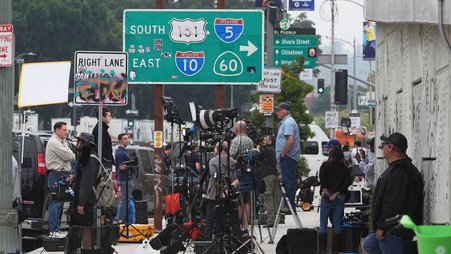How press can survive interactions with police on the skirmish line


Photo courtesy of Stephanie Keith
Journalists have the right to cover protests and demonstrations.
Protests are one of the most dangerous places for journalists in America. Journalists are routinely prevented from gathering the news, illegally arrested, and attacked by law enforcement and demonstrators.
Journalists have a First Amendment right to cover public protests. Protecting and expanding that right ensures that the public can learn what’s happening at protests and how they are policed.
Federal agents are assaulting journalists across the country. Congress needs to speak out.
U.S. Immigration and Customs Enforcement has been assaulting journalists around the country, from reporters in Chicago who were shot with pepper balls to a reporter in New York who was slammed to the ground and needed to be hospitalized. Tell Congress to take a stand and demand answers.

Court ordered settlement requires Minnesota State Patrol to stop arresting and assaulting journalists.

While we did not see the scope of national social-justice protests of 2020—a year in which journalists were arrested or assaulted on average more than once a day—2021 still outpaced the years before it for press-freedom violations. We systematically capture this data in the US Press Freedom Tracker, where Freedom of the Press Foundation, in partnership with the Committee to Protect Journalists and other press freedom groups, has documented aggressions against journalists in the United States since 2017.

More than 60 journalists have sued police after arrests or assaults at protests, according to new analysis from the U.S. Press Freedom Tracker. That total amounts to 82% of the lawsuits filed by journalist or media outlet plaintiffs against public officials.

The 56 journalists arrested or detained in the United States in 2021 approaches the combined totals of 2017, 2018, and 2019 — an alarming indicator of the state of press freedom, according to a new report released by the U.S. Press Freedom Tracker.

The U.S. Press Freedom Tracker has published an overview of a truly remarkable year’s worth of press freedom violations during nationwide protests. The Tracker builds on individually reported incidents to provide the definitive telling of the crackdown on journalists that emerged alongside the protests.

Law enforcement officers have photographed the faces or IDs of nearly three dozen journalists in Oregon and Minnesota in recent months, according to new data published by the U.S. Press Freedom Tracker. These measures don’t appear to serve any law enforcement purpose beyond intimidating reporters who are doing their job.

After a tumultuous 2020 saw unprecedented numbers of journalists arrested and detained, some held hope that police departments would learn from public backlash and change their behavior. In a coordinated crackdown on protests that included the arrest or detention of more than a dozen journalists, the Los Angeles Police Department showed last week that it has done no such thing.

A jury in Polk County, Iowa voted to acquit reporter Andrea Sahouri after she was arrested last summer while covering a protest. The case has been widely criticized by press freedom and human rights advocates around the world.

At least four journalists around the country will face trial this month following their arrests while covering Black Lives Matter protests, part of the unprecedented number of legal detentions of reporters in 2020.

Freedom of the Press Foundation releases its 2020 Impact Report, outlining the work we’ve accomplished in the past year, an overview of our major projects and initiatives, and how we will be expanding on our work in 2021.
Something went wrong and your email updates subscription could not be processed. Please visit our signup page and try again.
Thank you for encouraging Congress to speak out against ICE’s appalling attacks on journalists.
Share this message on social media: